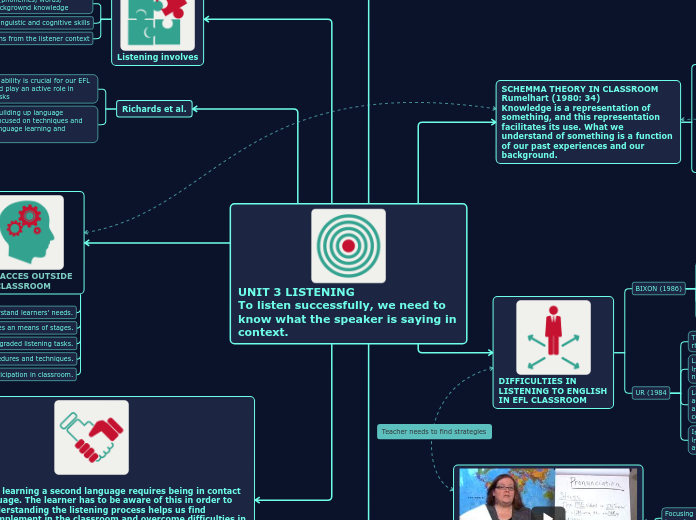
UNIT 3 LISTENING To listen successfully, we need to know what the speaker is saying in context.
The Listening Process
Sounds go to a sensory store, organized in meaningful units.
Processing of the information by the short term memory.
Construction of a meaning and, transfer information to the long term memory for later use.
Listener does not have the language skill yet
Little knowledge about the language
SCHEMMA THEORY IN CLASSROOM Rumelhart (1980: 34) Knowledge is a representation of something, and this representation facilitates its use. What we understand of something is a function of our past experiences and our background.

Bottom-up Fom the page to the brain.

Top Down The brain tries to find existing knowledge to help assimilate new information.

DIFFICULTIES IN LISTENING TO ENGLISH IN EFL CLASSROOM
BIXON (1986)
Weak relationship between English sounds and the meaning.
Changes in the sound in rapid connected speech with various tones.
The rhythm pattern of English speech.
Different ways of pronouncing the “same” sound.
UR (1984
The problem of sounds which include pronunciation, rhythm, intonation and stress.
Lacking the ability to skim what is heard, which includes the inability to keep up with redundancy, noise, and the inability to guess
Lacking exposure and practice with different kinds of accents and colloquial vocabulary in specific texts, and practice with different kinds of accents and colloquial vocabulary.
Inability to link words to the context, and unskillful in using strategies to summarize heard information at the macro-level and micro-level.
What EFL teachers can do to assist learners develop their listening skills according to Rost (1991)
Focusing on meaning and trying to learn new and important content.
Comprehension activities.
Attention to accuracy and an analysis of form.

Listening involves
Individual linguistic units (phonemes, words, grammatical structure, backgrownd knowledge
Linguistic and cognitive skills
Strategies and expectations from the listener context
Richards et al.
The mastery of listening ability is crucial for our EFL learners, and they should play an active role in activities and focused tasks
The role of listening in building up language competence should be focused on techniques and strategies to promote language learning and comprehension.

SELF-ACCES OUTSIDE THE CLASSROOM
Understand learners' needs.
Visualize the objectives an means of stages.
Set meaningful, focused and graded listening tasks.
Apply effective procedures and techniques.
Encourage participation in classroom.

